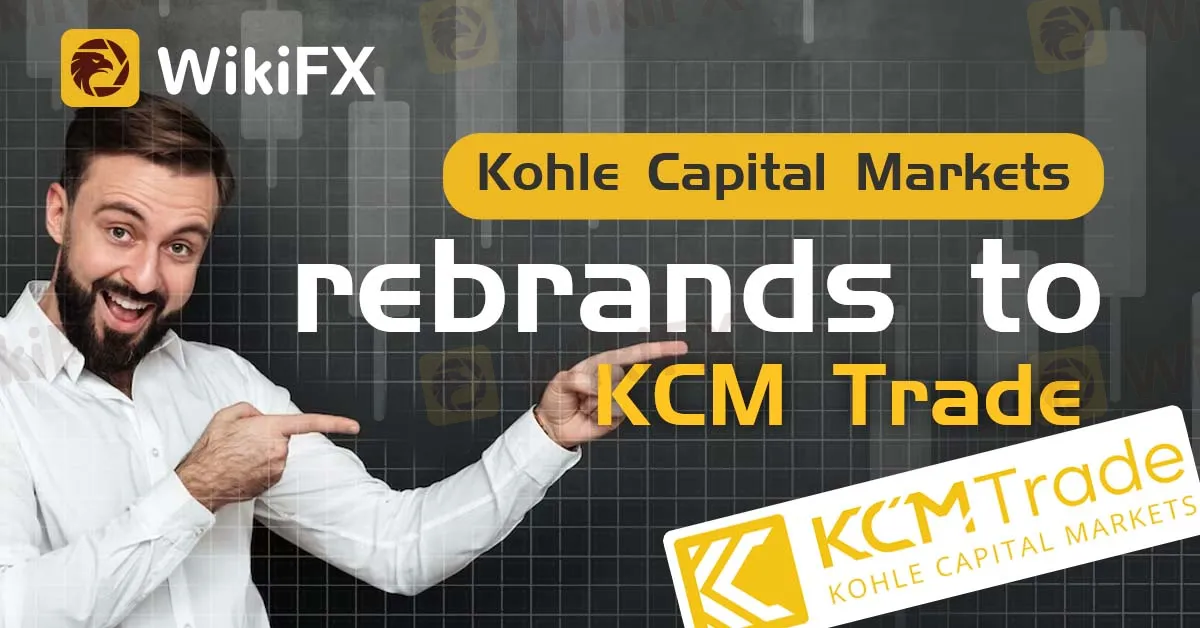简体中文
繁體中文
English
Pусский
日本語
ภาษาไทย
Tiếng Việt
Bahasa Indonesia
Español
हिन्दी
Filippiiniläinen
Français
Deutsch
Português
Türkçe
한국어
العربية
Kohle Capital Markets rebrands to KCM Trade
Abstract:Kohle Capital Markets has announced a rebranding of the company to KCM Trade. The company said that this strategic move is a reflection of its “unwavering committing to providing unparalleled value and exceptional customer experiences.

Details
The online forex and CFDs broker Kohle Capital Markets has announced a rebranding of the company to KCM Trade. The company said that this strategic move is a reflection of its “unwavering committing to providing unparalleled value and exceptional customer experiences, as we expand our footprint in key markets across the globe.” Ryan Tsui, Group CEO of KCM Trade said: “Our new brand identity is a reflection of our commitment to delivering world-class financial services to our clients. We are confident that this rebranding effort will help us better serve our clients, enhance our market presence, and reinforce our position as a leader in the industry.”
One of the reasons why Kohle Capital Markets rebrands to KCM Trade is to expand its business operations, which could include opening new branches throughout Southeast Asia, including Vietnam, Indonesia and the Philippines, and other key markets.
About KCM Trade

KCM Trade(Kohle Capital Markets) is a forex & CFDs provider, offering financial investment business trading services primarily for institutional clients, headquartered in Sydney, Australia, with direct offices in Mauritius and Hong Kong. KCM holds a general financial license from the Australian Securities and Investments Commission (ASIC), with Regulatory License No. 489437, permitted to provide financial services in Australia. KCM controlling parent company, Lead Technology Holdings Limited, was incorporated in the British Virgin Islands in 2016 and later launched Kohle Capital Markets Ltd. under the financial derivatives trading services brand of Kohle Capital Markets in February 2018.

KCM offers over 40 pairs of Forex currencies, precious metals, indices, and energy CFDs. While some popular instruments like stocks, ETFs, and cryptocurrencies are not available on the KCM platform.
This broker is a regulated broker and WikiFX has given this broker a decent score of 8.54/10.

Disclaimer:
The views in this article only represent the author's personal views, and do not constitute investment advice on this platform. This platform does not guarantee the accuracy, completeness and timeliness of the information in the article, and will not be liable for any loss caused by the use of or reliance on the information in the article.
Read more

Bitpanda Secures Full Broker-Dealer License in Dubai
Bitpanda has officially obtained a full broker-dealer license from the Dubai Virtual Assets Regulatory Authority (VARA), marking a significant milestone in its international expansion. This approval, which follows preliminary authorization granted three months earlier, enables the European digital asset exchange to introduce its comprehensive suite of virtual asset services to investors in the United Arab Emirates (UAE).

Interactive Brokers Expands Crypto Trading with Solana, XRP, Cardano, and Dogecoin
Interactive Brokers adds Solana, XRP, Cardano, and Dogecoin to its platform, enabling U.S. and U.K. clients to trade crypto 24/7 with low fees.

Gold Surges to New Highs – Is It Time to Buy?
Recently, gold prices have once again set new records, surpassing $3,077 per ounce and continuing a four-week winning streak. Is It the Right Time to Invest?

Why Does the Yen's Exchange Rate Fluctuate Repeatedly?
JPY Exchange Rate Fluctuations: How Should Investors Respond?
WikiFX Broker
Latest News
Enlighten Securities Penalized $5 Million as SFC Uncovers Risk Control Failures
Why Are Financial Firms Adopting Stablecoins to Enhance Services and Stability?
Experienced Forex Traders Usually Do This Before Making a Lot of Money
Octa vs XM:Face-Off: A Detailed Comparison
When High Returns Go Wrong: How a Finance Manager Lost RM364,000
Bridging Trust, Exploring Best—WikiEXPO Hong Kong 2025 Wraps Up Spectacularly
Fidelity Investments Explores Stablecoin Innovation in Digital Assets Sector
Interactive Brokers Expands Crypto Trading with Solana, XRP, Cardano, and Dogecoin
SEC Ends Crypto.com Probe, No Action Taken by Regulator
Why More People Are Trading Online Today?
Currency Calculator







